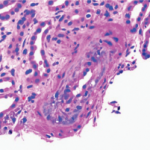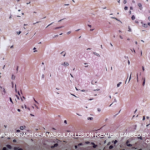NEW YORK (Reuters Health)—Barrett’s esophagus is common in women with systemic sclerosis or scleroderma (SSc) and is often accompanied by dysplasia, according to the largest study on prevalence of Barrett’s esophagus in women with SSc. In Barrett’s esophagus, chronic gastric reflux causes the lining the esophagus to be replaced by metaplastic cells that may lead…

Under Pressure: An Update on Pulmonary Hypertension
ACR CONVERGENCE 2020—In patients with connective tissue diseases, such as systemic sclerosis (SSc), pulmonary hypertension (PH) remains one of the leading causes of morbidity and mortality. In her lecture on Friday, Nov. 6, Pulmonary Hypertension: An Update, Mardi Gomberg-Maitland, MD, MSc, professor of medicine and medical director of the Pulmonary Hypertension Program at The George…

A Primer on the Management of Scleroderma Emergencies
Patient with autoimmune disease may experience medical emergencies. Here is an overview of recognition and management of three emergent situations for patients with scleroderma: critical digital ischemia, scleroderma renal crisis and intestinal pseudo-obstruction…

Malignant Complications: Screening for Cancer in Rheumatic Diseases
Cancer and autoimmunity have a complex relationship. In a presentation, Ami Shah, MD, MHS, discussed how to use autoantibodies as tools for cancer risk stratification, how to approach cancer screening in individuals with new-onset disease and more…

The Latest Advances in Sjögren’s, Scleroderma, RA, Gout & More
ATLANTA—At the ACR/ARP 2019 Annual Meeting, several widely renowned experts across an array of specialty subjects provided a comprehensive and compelling review of advances in the understanding, diagnosis and treatment of a number of rheumatologic conditions. Sjögren’s Syndrome Frederick Vivino, MD, FACR, chief of rheumatology at Penn Presbyterian Medical Center and professor of clinical medicine…
Off-Label Coverage of Mycophenolate for Scleroderma under Medicare Part D
Based on a request by the ACR Insurance Subcommittee, off-label use of mycophenolate for scleroderma has been added to a Medicare-approved compendium.

FDA Approves Nintedanib for SSc-ILD, But Temper Your Expectations
The U.S. Food & Drug Administration (FDA) approved nintedanib for systemic sclerosis associated interstitial lung disease (SSc-ILD) on Sept. 6 after a randomized, controlled trial (SENSCIS) demonstrated significant benefit against placebo.1 At a cost of $96,000 per year, treatment reduced the adjusted annual rate of change in forced vital capacity (FVC) from –93.3 mL in…

Case Report: A Patient Develops Scleroderma Renal Crisis
Scleroderma renal crisis (SRC) is a life-threatening complication of systemic sclerosis. SRC occurs in 2–15% of patients with diffuse sclerosis and usually within the first five years from the time of diagnosis. Risk factors for SRC include, but are not limited to, early diagnosis, corticosteroid or cyclosporine use, and the presence of anti-RNA polymerase III…

Can REVEAL Tool Predict Survival in SSc-Related Pulmonary Arterial Hypertension?
A prognostic tool developed to predict survival in patients with various forms of pulmonary arterial hypertension (PAH) is fairly accurate in predicting survival outcomes for many patients with PAH related to systemic sclerosis (SSc-PAH), according to a new study. However, the prognostic accuracy is less reliable for SSc-PAH patients with the highest risk of death….

Case Report: Can Salt-&-Pepper Skin Mean Systemic Sclerosis?
Systemic sclerosis (SSc) is a multi-system connective tissue disease in which skin and internal organ fibrosis are associated with an obliterative micro-vasculopathy and a degree of inflammation.1 Patients often report it takes one to three years from the appearance of the first signs and symptoms before they receive a diagnosis. The signs and symptoms of…
- « Previous Page
- 1
- 2
- 3
- 4
- 5
- 6
- …
- 12
- Next Page »